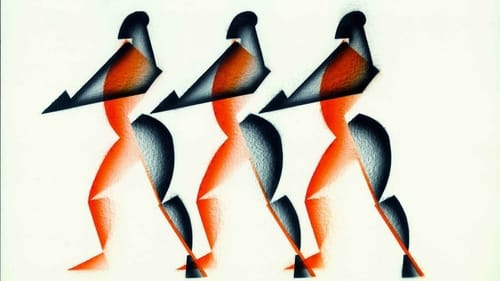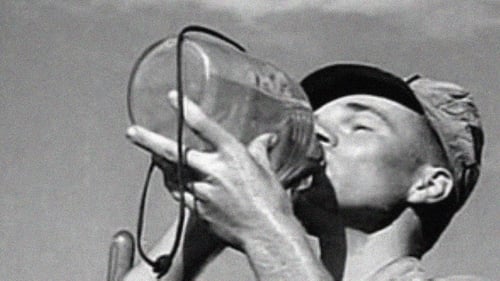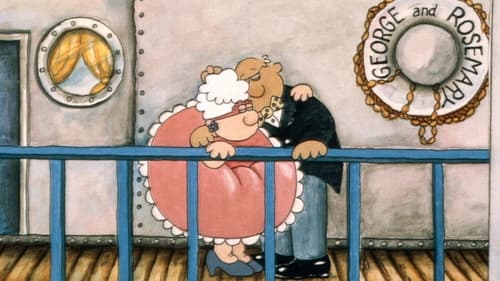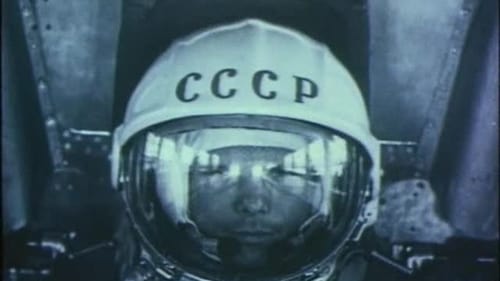Brothers Bearhearts (2005)
Genre : Animation
Runtime : 21M
Director : Riho Unt
Synopsis
The heroes of the film are three bear cubs from the cult painting by Ivan Shishkin "Morning in a Pine Forest". After losing their painter mom, the three brothers Henry, Vincent, and August appear in Paris, the City of Light every creator dreams of. All attempts to earn their living as artists fail. Their impressionistic "collies" won't be acknowledged. Under cover as circus lions, the bear cubs travel back to Russia to find the heritage of their mom.

The residents of a building have found novel ways to enter and exit as their front door is broken. However, once the door is repaired they continue to avoid the door.

Puppet animated folk tale about an old lady who finds a ball of yarn. After picking it the ball changes into a little dog, which has the magical power to be crocheted into anything the old lady fantasizes.

Triangle is a dance in which young man and woman entwine in a succession of lithe movements. The association is with the triangle shape, in a human context involving the introduction of a second woman into the mix. This triggers a dynamic of jealousy and rage, though it seems reconciled at the end. Nominated for an Oscar in 1995 it is a wonderfully envigorating fusion of dance, music and animation.

Playing painterly form with and against story-telling form, this Short Story is a loop that depicts a loop and is itself looped.

Two deaf and dumb children. She is the daughter of an American Oil engineer. He is the son of an Algerian farmer. They meet and manage to communicate, transcending all the cultural barriers that separate them.

Historically, the cinema close-up was initially employed to convey emotions through facial expressions. But soon filmmakers also began focusing their attention on hands. Using film extracts, Farocki explores this visual language, its symbolism, Freudian slips, automatisms and its music. Often, hands betray an emotion which the face tries to dissimulate. They can also function as a conduit (exchanging money) or witness to a form of competence (work).

The boisterous and cheerful lives of the residents of Cameroon are barely dented by incursions of supernatural power in this humor-filled rendition of traditional folk tales in modern guise. In the story, a cheerfully naughty girl crosses paths with a witch who has the power to satisfy her curiosity about men by changing her into a young man. She then becomes one of the boy suitors for the amorous attentions of a policeman's daughter. Some of the men have unusual names and even odder magical gifts: one of them has the ability to make a man's genitals disappear when he shakes hands with him.

A gifted poet checks into a Gothic hotel in hopes of meeting the woman with whom he has long been enamored. He is surrounded by a variety of offbeat characters like the hefty homosexual cook, shadowy clerks, snooty waiters, and valets prone to violence. He finally meets the woman of his dreams only to lose her and ultimately meet with tragedy.

This Oscar-nominated documentary short tracks the shift in the relationship of an individual to his work between the 19th century and today. Focusing on how nails are made, we first see a blacksmith laboring at his forge, shaping nails from single strands of steel rods. The scene then shifts from this peaceful setting to the roar of a 20th century nail mill, where banks of machines draw, cut, and pound the steel rods faster than the eye can follow.

Made as a relief worker's master's thesis, this documentary chronicles the difficulties of rebuilding a community in post-Pol Pot Cambodia

A documentary showing the struggle to bring electricity to rural areas of the United States.

A shy old man works up the gumption to meet a woman on whom he has a crush.

An ailing elderly woman is paid a perfunctory visit by her family while she sits despondently in a nursing home. Nobody can get through to her except for her young grandson, who talks to her about the happy times they shared between the two of them when she was well.

In this animated version of Edgar Allan Poe's story, a traveller arrives at the Usher mansion to find that the sibling inhabitants are living under a mysterious family curse: The brother's senses have become painfully acute, while his sister has become nearly catatonic.

Through puppets and animation, a traveler tells his story of walking through Settsu, coming to the town of Ikuta. He asks if someone can show him the Seeker's Mound. Late that day, a solitary maiden says she will lead him there.

A man paves his own way to his own soul through an intellectual quest, tragedies of nations and personal drama. The road moving through the cosmic distances is a flight into one's internal world. This flight and this drama are revealed in this philosophical film-poem.

Shiro and Keita didn’t manage to enter university and are stuck in their hometown delivering newspapers. Shiro persists on finishing a film they started, but Keita is not very enthusiastic.

The Martians speculate on the nature of Earth's apparent dominant life form, automobiles.

Sergey Dvortsevoy makes his international debut with this astonishingly intimate portrait of a nomadic family on the Kazakh plains. Several scenes in this slow, elegant film betray a certain dry humor -- a child devouring the last of a bowl of yogurt and then crying; a cow getting its head stuck in a pail; and a woman singing to herself, accompanied by her snoring husband. Other scenes capture the nomads' hardscrabble lives -- drunken herdsmen in the grips of existential despair, growling dogs, and a camel enduring a rather grim septum piercing. By the end of the film, the family pulls up stakes and herds its sundry four-legged beasts -- camels, cattle, goats, dogs, and horses -- to a more fertile plain. This film was screened at the 1999 Yamagata International Documentary Film Festival.










